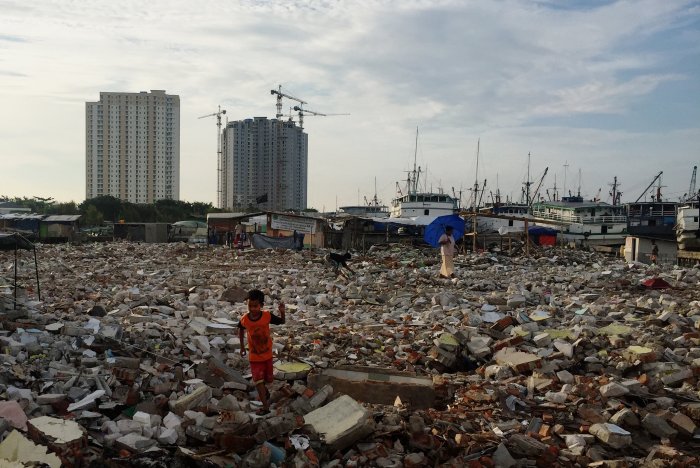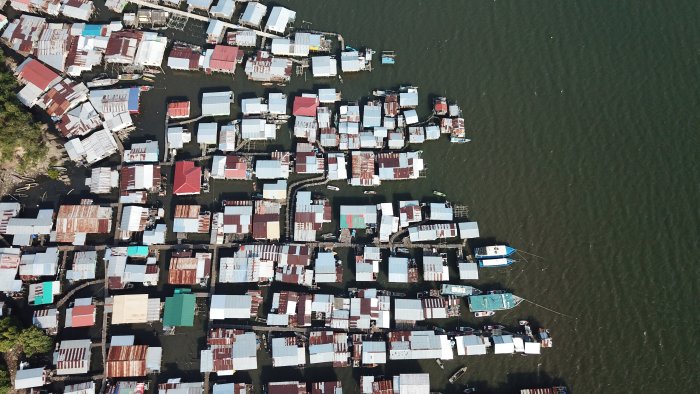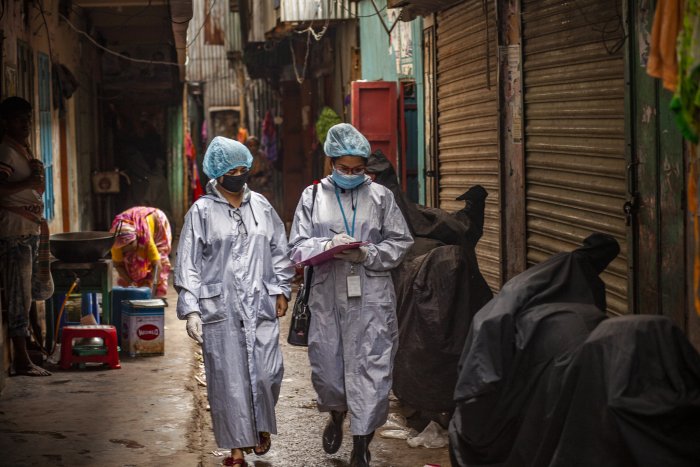The more things change, the less they should stay the same

A recently demolished 'kampung' or informal village in North Jakarta. The former residents of Pasar Ikan Penjaringan (which literally means Penjaringan fish market) say they were given one week's notice before their houses were reduced to rubble. In the background, new high-rises are under construction in the coastal community of Muaru Baru. ©Chris Bentley (CC BY-NC-ND 2.0)
Human beings have over time played shifting parts in creating ever more intricate mechanisms to manipulate, analyse, interpret and change our world, environmentally, socially, economically, culturally and politically. The outcomes of decades of investments, interventions and inventions have brought benefit to many, but have also brought huge detriment to our shared planetary environment and to the lives of so many who inhabit it.
The more things change, the less they should stay the same
Most recently, the Covid-19 pandemic has sharply highlighted existing (and sometimes deepening) inequalities, inequities and injustices, reinforcing what had already been a growing realisation of the inevitability and centrality of uncertainty and complexity to all forms of development (Leach et al, 2020). It has thrown into sharper relief a range of problems with ‘mainstream’ development concepts, institutional practices and power relations, narrow notions of progress and growth, and linear planning models.
As the SDGs and other global frameworks have set out visions of achieving a more equitable and sustainable world where people everywhere can live their lives free from poverty and injustice, the time seems right for a ‘recasting’ of development and development studies that is underpinned by the centrality of universality (development as progressive change for all), plurality, justice, equity and resilience. Rather than small adjustments and tweaks to concepts and practices, at the Institute of Development Studies (IDS) we are calling for a radical reimagining of what is possible: rethinking economies; re-envisaging humanity-nature connections (and so notions of ‘human development’); engaging critically with digitalization on massive scales; reconfiguring citizen-state relations amidst new kinds of power; adapting to shifting geo-political orders and elaborating new principles for cognitive justice and the prioritization of citizen knowledge (Taylor and McCarthy, 2021). The events of the last year have challenged us to double down on the commitments and priorities laid out in our current strategy, given the scale and the urgencies of the challenges the world is facing.
For whom is recasting of development studies important?
In our view, development, recast, can become a key catalyst for engagement with citizens around justice, empowerment and accountability; with governments around soft power diplomacy, bringing needs and openings for ‘grand strategy’ and ‘mutual learning’ that integrate foreign policy, social policy and development approaches grounded in the aspirations, needs and realities of citizens and communities; with academic research, policy and practice communities around knowledge co-creation, learning, civic engagement and the range of moves now glossed as ‘decolonizing’ (Taylor and Tremblay, 2022); and with a variety of organizations and institutions for whom a recasting of development will present both opportunities and challenges. For development studies, the field that shapes and engages with development, we believe strongly that there is a need for complementary combinations of world-leading research, education and engagement involving collaborations between natural and social sciences and humanities; policymakers, businesses, funders, practitioners, advocates, activists, citizens and intermediaries who help forge connections between these groups; all underpinned by a commitment to co-creation of knowledge, championing evidence, equitable partnerships and mutual learning between countries.

What questions are guiding us?
- How should development be recast if trends, pathways and trajectories, and the global frameworks that influence these, are to lead to positive change and transformation?
- How can development engage differently with diverse voices, knowledges and perspectives in light of the SDGs and beyond, in a wider context of uncertainty, complexity and universal challenges?
- What types of learning are needed to support new approaches to universal, equitable and inclusive models of development, and how can we strengthen the connections between diverse forms of knowledge, evidence, policy and practice in different contexts?
- How can development studies itself become more equitable, collective and collaborative in order to address historical structural inequities and power asymmetries that constrain its ability to support transformative change?
What should be considered?
We have identified several issues for development studies, as part of an emerging ‘recasting’ agenda for reflection and inquiry:
- Nationalistic tendencies and the closing of democratic space in both authoritarian and democratic states. Populism is becoming ever more widespread in rich and poor countries, authoritarian and democratic ones. There are tendencies for shutting down political freedoms – controlling legal systems, the press etc, or direct (sometimes violent) restrictions on (non-violent) protests. Some nations are withdrawing from multilateralism; crucial decisions are being made on a nation by nation basis, frequently short-term, often with future generations not represented in current decision-making amidst a closing of civic space coupled with a trampling of digital rights. Development studies can help document developments; analyse causes and counter these authoritarian, polarizing tendencies, and identify and inform potential policy and action directions. It can explore the drivers of change that promote more effective, accountable and inclusive governance institutions and mechanisms that can help re-establish trust with citizens, including the possibilities offered by digital technologies.
- Epistemologies and the politics of knowledge. Development studies can promote inter-, trans- and multi-disciplinary approaches to tackle complex challenges and uncertainties. It can help make more transparent the political economies of knowledge and evidence, and reveal more clearly the interests and ideologies underlying different models and conclusions.
- Contemporary capitalisms. Recent analyses of capitalism and prevailing financial systems are revealing how their workings underlie so much of development, including rising inequality, indebtedness, failures to tackle environmental issues and health injustices (including obstacles to cheap production and sale of vaccines in low- and middle-income countries). Development studies can offer deeper analysis of current and emerging financial models that may work against sustainable futures.
- Historical perspectives. Past decades offer a wealth of experience to draw upon and to learn from. Today’s realities are products of history; to ignore it is almost certain to lead to failed analysis and policies. Development studies could reflect more on economic and political revolution and evolution; the high hopes accompanying independence and the much more complex reality which nonetheless was extraordinarily successful by many measures and in many places. It can help us learn from history on ways to build a new universal agenda, including resisting authoritarianism and aggressive forms of nationalism.
- Tensions between contextualized perspectives and understandings of global development. It is challenging to balance activities, engagement and conversation narratives in specific contexts alongside global values. Development studies can interrogate the new development norms emerging through these conversations and how these are informed by different perspectives. It can include debates about decolonization, engagement with indigeneity and indigenous knowledges, and fostering of a diversity of voices and perspectives whilst also challenging mainstream power.
- Equity and the needs of those hardest to reach. We struggle with questions on how to work with and build on approaches to intersectionality, where different forms of (in)equity (by gender, class, disability, race, place etc) are not just additional but mutually constituting and reinforcing. Development studies can explore issues such as the evolution of labour and accumulation and the role of technology; fragility of the labour market; taxation; implications of climate change and environmental challenges for equity.
- The fundamentals of aid. Aid as acts of human-human and political solidarity remains hugely important, especially when dealing with humanitarian challenges, but there is also a need for international funding mechanisms for collective international action on longer-term issues and to fund the global governance institutions and services we rely on such as the WHO. Development studies can explore questions about wealthier countries’ future engagement in development cooperation and what can be learned by fostering mutual learning with countries that have taken very different approaches, such as China.

These reflections on a recasting of development studies are a work in progress but also demonstrate our commitment at IDS to continuing a journey of exploration and discovery. We acknowledge the contributions to our thinking on these matters by so many partners and collaborators who are also embarked on similar paths. We look forward to engaging with others in a wider context of dynamic change and transformation.
The more things change, the less they should stay the same

Director of the Institute of Development Studies

Director of Research at the Institute of Development Studies
The more things change, the less they should stay the same
References
- IDS Strategy 2020-2025
- Leach, M., H. MacGregor, I. Scoones and A. Wilkinson (2020) Post-pandemic transformations: How and why Covid-19 requires us to rethink development. In World Development, Volume 138, February 2021, 105233
- Taylor, P and M. McCarthy, (Eds) (2021) IDS Bulletin: Building a better world– the crisis and opportunity of Covid-19. Vol 52 No 1 March 2021
- Taylor, P. and Tremblay, C. (2022) Decolonising Knowledge for Development in the Covid-19 Era, IDS Working Paper 566, Brighton: Institute of Development Studies, DOI: 10.19088/IDS.2022.018